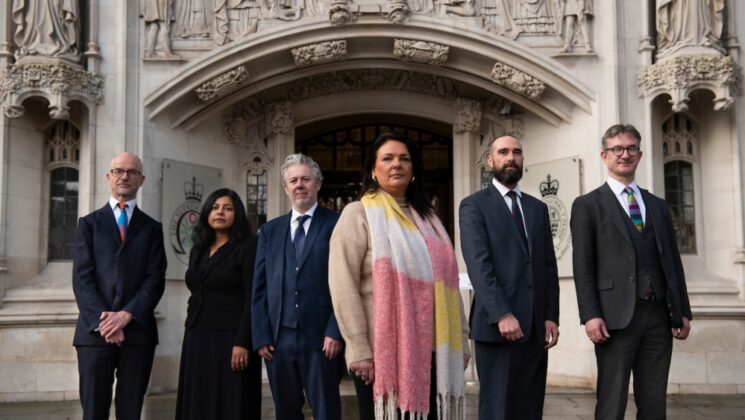Update
On 17 April 2024, Fiona Mercer and UNISON won their case at the Supreme Court.
Judges told employers they’ll no longer be able to discipline their staff for taking part in legal strike action.
Fiona said: “I’m delighted at today’s outcome. Although it won’t change the way I was treated, it means irresponsible employers will now think twice before behaving badly towards their unhappy staff.
“If they single strikers out for ill-treatment, they’ll now be breaking the law.”
Continue reading below for details about how the case came about, how UNISON got involved and why it was is so important. Or read more about the win here.
This article was originally published on 12 December 2023.
This week, UNISON’s legal team finds itself once again challenging the government in the Supreme Court. The union is acting on behalf of care worker and UNISON member Fiona Mercer (pictured above, centre), who was suspended by her employer during a period of strike action in 2019.
The case presents an opportunity for the union to close a loophole that allows rogue employers to mistreat staff taking part in legal strike action.
For Fiona, the Supreme Court hearing is the final step in her lengthy battle for justice that began four years ago.
Back in 2019, Fiona was a full-time care worker for adults with learning difficulties and mental health problems. She worked in a bungalow with three service users who required 24/7 care, which often involved working long 15-hour “sleep-in” shifts.
When the company, Alternative Futures Group Limited (AFG), announced plans to cut payments to care staff working sleep-in shifts, Fiona, who was a UNISON rep, organised and participated in strike action.
As a result, she was suspended by the charity and prevented from attending work or contacting her colleagues. This was right in the middle of the strike.
Singled out
“It was horrible. I’d done nothing wrong. I was at work one day and the managers knocked on the door and asked for a meeting. As soon as that happened, I said to my colleague: “I’m getting suspended”
“I just knew that it was because of the involvement I’d had with the union meetings. Every time I’d gone to an organising meeting to try and resolve things with the employer, I’d been singled out. And I was right. In the meeting, the managers just handed me a handwritten piece of paper saying I was being suspended for two weeks, and those two weeks just happened to be during the time of the strike.
“The suspension happened right after I’d rang another support worker to ask if they were striking, and whether they’d told the family of the service user.
“I was totally singled out, ostracised and worried I was going to get the sack. The girls I’d worked with there were all my friends, and the only friends I had at the time, and I was told that I wasn’t allowed to speak to them in any way while I was suspended.”

Fiona Mercer standing outside the Supreme Court (Credit: Marcus Rose)
At the time of her suspension, Fiona did not know whether it had any deterrent effect on others as she was not in touch with anybody. Afterwards, she found out that many UNISON members did not take strike action, with one colleague telling her they thought it was because they were fearful of being suspended too.
“I was so annoyed, they’d treated me terribly and I knew I’d not done anything wrong.”
Fiona remembers being so distressed that she had a panic attack in a supermarket car park: “I just started hyperventilating, I was so worried I was going to lose my job. Thankfully my husband was there and really supportive, he reassured me that ‘we’d muddle through’, but I should never have even been put in that position.”
The case’s journey through the courts
With the support of UNISON, Fiona brought a case against AFG in 2019. It went to an employment tribunal in 2020 where the employer won. But then UNISON appealed the decision and the employment appeal tribunal (EAT) in 2021 found in her favour and said she should not be treated unfairly for having taken part in industrial action.
The EAT also amended UK law, creating a new protection for striking workers, to comply with international law. Fiona had safely won against her employer.
However, her victory and the accompanying new protection for striking workers attracted political attention – and things dramatically escalated.
In 2021, the then Secretary of State for Business Kwasi Kwarteng, who has repeatedly taken aim at workers’ rights to strike, intervened by taking the case to the Court of Appeal.
Fiona remembers her shock at the government’s involvement: “I just thought: how dare they? How dare they jump in and stand against the workers? They should have been on our side, saying ‘we don’t want workers to be unfairly treated’
“It was a real wake-up call for me on where the government stands. Not with us, that’s for sure.”
In March 2022, the Court of Appeal reversed the EAT decision in March last year, leaving UNISON concerned that this would mean bad employers had little to stop them mistreating workers who strike. So the union appealed to the Supreme Court.
The future of the right to strike
When Fiona first told UNISON about being suspended, she never imagined that her case would one day end up in the Supreme Court.
Now, with UNISON’s legal team behind her and a national spotlight on the case, Fiona is now excited: “The union legal team have been amazing. My employer tried to isolate me, and now I have the full backing of the biggest union in the country. That in itself feels fantastic, knowing that I wasn’t just left alone.”
UNISON’s argument in the Supreme Court which will be heard on 12 and 13 December, is that the UK is operating outside of international law, and workers are left without proper protection at work.
While UK law limits employers from sacking workers involved in strikes or other workplace disputes, it does not stop unscrupulous employers from taking disciplinary action or generally making life difficult.
At a time where the government appears determined to strip workers of their rights to strike, the union’s case has the power to influence the future of labour rights for all workers.
With this in mind, Fiona Mercer remains unfazed: “I’m doing this for every single person who’s been victimised by their workplace for being in a union.”
The judgment is expected in early 2024.






Well done Unison and Fiona, I would like to find out outcomes from Supreme Court and hope Fiona and her family will recover from this awful experience .
Great.. Great… Great… Employers need to realise that workers absolutely have right. Without the Unions this would never have been possible. Without the workers Management would not AND COULD NOT DO A GOOD JOB… They haven’t got a clue what Great work is done by the workers on the ground. Like the tree full of monkeys, managers are at the top of the tree looking down and barking orders down to the monkey’s on the bottom. As the monkeys look up all they actually see is ar.. ho… No disrespect to the animal world intended
Good luck Fiona, stay strong and thank you for speaking up about your situation x
Victorian employment law where the worker is being used for the 1) not being paid her monies 2) Strike action is every workers right and the government and employer should not be bullying in this way 3) A case for monies being returned for the actions of both.
4)Supporting the employee is the correct thing to do for any union.
Well done Unison and especially Fiona Mercer
As Usual bad management ,they could and should have tried to resolve the issues within the workplace in partnership .Its another form of bulling back to Thatcher era that’s why Unison have sorted out terms and condition for all staff to be treated fairly .
Well done Fiona we are all behind you . Dundee Unison Member for 36 years
Thank you all for your support. Hopefully the right decision will be made by the supreme courts. Unison and the barristers involved have been amazing.
Well done Fiona and Unison ,Private care companies continue to treat there workforce with contempt,and believe they are above the law.All private care companies continue to make so much profit while staff dont get sick pay,weekend enhancements or overtime rate.So well done
I think it is fantastic what you are doing stay strong
well done to Fiona, such a powerful story
Happy with the Supreme court judgement. Well done the whole team. Like your courage Fiona, keep it up.